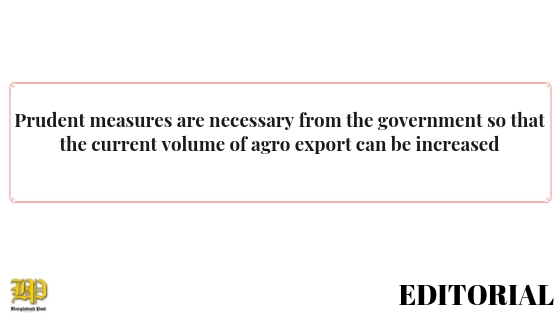To sustain the current growth of agro export
Prudent steps imperative

Being self-sufficient in food production is indeed a great achievement for a country of 17 million people where more than 1252 people live per square kilometre. Of late, Bangladesh has achieved self-sufficiency in food production and seen a boost in exports of agro-products. It is envisaged that if the country can keep the momentum of its efficacy in food production, it will play a key role in achieving five targets of the Sustainable Development Goals (SDGs) such as zero hunger, good health and wellbeing, sustainable cities and communities, responsible consumption and production, and life below water. Hence, it is very important for the government and authorities concerned to continue their concerted efforts to maintain the momentum of the country’s food production and export growth of agro-products.
Read More: Employment-based growth needed to improve living standard
Bangladesh’s agriculture has seen a revolution over the last decade. We have seen substantial growth in agro-production, we have invented high-yield crops and consequently all the sub-sectors including fisheries, animal farming and processed agro-food have underscored remarkable growth that indicates a sustainable food system. Also with the rapid growth of population, Bangladesh has been successful to give a boost to its agricultural growth and equip its agricultural sector with new technologies. As a consequence, country’s earning from the exports of agricultural products saw a whopping growth in last nine months of the current fiscal whereas in the past few years the country had undergone a major fall in agricultural growth. In FYY2016-2017, the contribution of agriculture to GDP was only 14.79 per cent whereas in 1952 it was 52 percent as reported by World Bank. However, maintaining the tempo of the growth would not be so easy for Bangladesh due to scarcity and degradation of agricultural land and certainly the impact of climate change in the forms of salinity intrusion, soil degradation and so on.
In climate-prone Bangladesh, agriculture is influenced by climatic variables such as temperature, rainfall, humidity and so on. Here production of crops, particularly rice, is often constrained by different climatic hazards such as floods, droughts, soil and water salinity, cyclones and water surges. Hence, the authorities concerned should address the consequences of climate change as a major threat to the country’s optimum crop production and overall agricultural output. In this regard, Agricultural Research Institute should work for diversifying the cropping system introducing new verities.
Read More: Ensure standard services to attain SDGs
Also in order to keep the momentum of the current growth of agro export unhindered, we should integrate efficient technologies, strengthen agricultural research, diversify agricultural production and improve market linkages for smallholder farmers. Also we should encourage educated youths to take agriculture as their profession so that they can play a significant role in developing the country’s agro sector.



